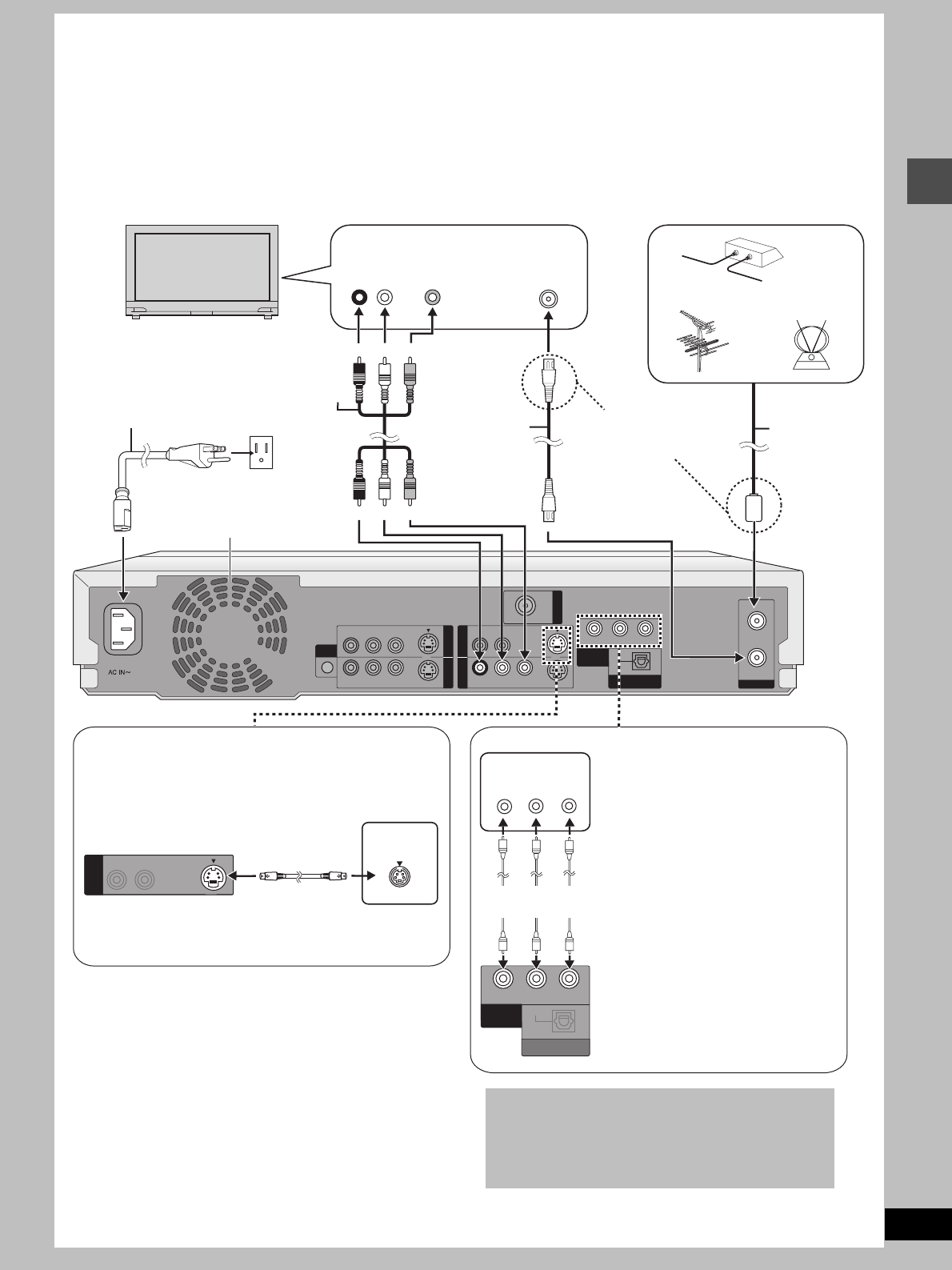
5
RQT7237
Setting up
STEP 1 Antenna and television connections
Preparation
≥Refer to the television’s operating instructions.
≥Turn the television off and disconnect its AC power supply cord.
To enjoy sound through other audio equipment (
➜
page 50)
To enjoy progressive video
Connect to the component video (480P) input terminals on a televi-
sion compatible with this unit’s copy guard system. (Video will not
be displayed correctly if connected to an incompatible television.)
≥All Panasonic televisions that have 480P input terminals are com-
patible. Consult the manufacturer if you have another brand of
television.
RF IN
RF OUT
VHF/UHF
OPTICAL
DIGITAL AUDIO OUT
(PCM/BITSTREAM)
COMPONENT
VIDEO OUT
(480P/480I)
YPB PR
R - AUDIO - L
R - AUDIO - L
VIDEO
VIDEO
S-VIDEO
S-VIDEO
(L3)
(L1)
I N 1 I N 3
R - AUDIO - L
R - AUDIO - L
VIDEO
VIDEO
S-VIDEO
S-VIDEO
OUT 1 OUT 2
OUT 1
EXTERNAL
CONTROL
R - AUDIO - L
S-VIDEO
OUT 1
AUDIO
IN
R L
VIDEO
IN
VHF/UHF
RF IN
IN
S VIDEO
COMPONENT
VIDEO IN
Y
P
B
PR
OPTICAL
DIGITAL AUDIO OUT
(PCM/BITSTREAM)
COMPONENT
VIDEO OUT
(480P/480I)
YP
B
P
R
COMPONENT VIDEO OUT terminals
These terminals can be used for either
interlace or progressive output and provide
a purer picture than the S-VIDEO OUT
terminal.
Connection using these terminals outputs
the color difference signals (P
B/PR) and
luminance signal (Y) separately in order to
achieve high fidelity in reproducing colors.
≥The description of the component video
input terminals depends on the television
or monitor (e.g. Y/P
B/PR, Y/B-Y/R-Y, Y/CB/
C
R). Connect to terminals of the same
color.
≥After making this connection, change the
black level for a better picture (➜page 45,
Video–Black Level Control).
S-VIDEO OUT terminal
The S-VIDEO OUT terminal achieves a more vivid picture than
the VIDEO OUT terminal by separating the chrominance (C)
and luminance (Y) signals. (Actual results depend on the tele-
vision.)
When making this connection, ensure you connect the audio
cables to the corresponding audio input terminals on the televi-
sion.
When making this connection, ensure you
connect the audio cables to the corre-
sponding audio input terminals on the
television.
To the antenna
Outdoor antenna
Cable TV
Indoor antenna
Television
Audio/Video cable
(included)
Antenna cable
(usually discon-
nected from the
television).
To household AC outlet
(AC 120 V, 60 Hz)
This unit
Cooling fan
Red White Yellow
or
S video cable
(not included)
Do not connect the unit through a video
cassette recorder
Video signals fed through video cassette recorders will be
affected by copyright protection systems and the picture
will not be shown correctly on the television.
Television
Video cable
(not included)
75 ≠ coaxial cable
(included) ➜below
Television
If the connector
doesn’t match
➜page 52
Red White Yellow
Connect last.
Also connect the AC
power supply cords for
the other equipment.
75 ≠ coaxial cable
≥The signal from the antenna passes through this unit and along
the 75 ≠ coaxial cable to the television even when this unit is
turned off. You don’t have to connect the antenna to the televi-
sion.
≥The picture and sound signal from this unit does not go through
the 75 ≠ coaxial cable to the television. Make sure you connect
one of the following terminals on this unit to the television: the
AUDIO/VIDEO terminals, the S-VIDEO OUT terminal or the
COMPONENT VIDEO OUT terminals. If the television has none
of these terminals, consult your local dealer.
AC power supply cord (included)
Conserving power
This unit consumes a small amount of power, even when it is
turned off (approx. 3.2 W). To save power when the unit is not to
be used for a long time, unplug it from the household AC outlet.


















